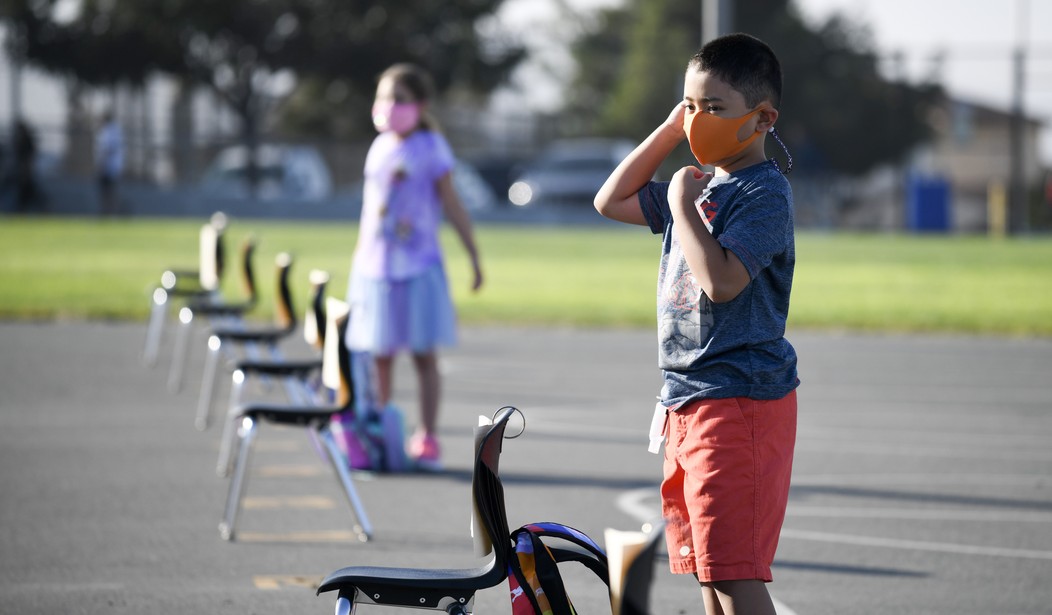School closures due to COVID-19 absolutely devastated students in this country, something only confirmed even more so by the results of the National Assessment of Educational Progress study showing math and reading scores at their lowest. Democrats, including and especially the Biden administration, shamelessly, tried to divert blame, just as they do on virtually every other issue.
In her opinion column for CNN, Jill Filipovic managed to be more clear-headed on the issue. "America has a problem. We, my fellow progressives, must admit it," the column from Tuesday now reads. Its previous title, "Before we can help students, liberals must admit school closures were a problem," was even more direct.
Filipovic's opening paragraph is strongly worded, as she mentions "unprecedented learning losses" and warns "for many students, it may simply be too late to make up such significant setbacks." This kind of stark tone continues throughout her piece.
Later on, for instance, she acknowledges that "It did not have to be this way." Although Filipovic claims that "the partisan finger-pointing that is already in full effect isn't particularly helpful," in the same sentence she writes that "progressives can look squarely at the harms that came from our own policies."
Of the long-term effects this study points to, Filipovic also writes that "it is a dark cloud looming over future generations."
Particularly worth highlighting is how schools in this country fared worse compared to European countries, and that black and Hispanic students also fared worse than white students:
Recommended
But by the fall of 2020, when we knew much more, the US remained a global outlier in keeping schools shuttered, particularly for the youngest students who were at very low risk of serious illness from Covid-19 and were the least able to learn remotely. Many European countries sent children back to the classroom and found that even short school closures were remarkably disruptive and resulted in significant academic and social-emotional setbacks. In the US, our closures extended for much longer, and it seems our setbacks may be far worse.
...
Unsurprisingly, the students whose schools were remote for the longest periods -- disproportionately Black and Hispanic students, in part because those students are more likelyto be enrolled in the urban school districts that kept up remote learning far longer than their rural and suburban counterparts -- experienced the most significant learning losses. This is one of the many ways in which the pandemic response has further cleaved apart already-sprawling inequities.
...
The costs of school closures weren't just student learning losses. They included a mass exodusof women from the workforce, setting many of those women back financially and consigning many of them to an impoverished future. They included Black students who, according to a McKinsey analysis from last year, stand to lose $2,186 every year over 40 years in the labor force -- compared to $1,348 per year for White students.
Though Filipovic did not name names, there's no reason not to, especially when it comes to Democrats running for office this November.
Sen. Patty Murray (D-WA) who is facing a surprisingly tight race in running for re-election, had quite the response while on CNN's "State of the Union" on Sunday. As Madeline highlighted, Murray not only expressed no "second thoughts" about school closures, but claimed she was "proud" of what Democrats have done.
WATCH: Patty Murray refuses to say that it was a mistake for Democrats to keep children out of school. pic.twitter.com/o1fvWJDvbz
— NRSC Rapid Response (@NRSC_Rapid) September 4, 2022
Then there's Karla Hernández-Mats, the running mate for Charlie Crist, who is the Democratic gubernatorial nominee running against Gov. Ron DeSantis in Florida. Among Hernández-Mats' many terrible qualities, she denounced Gov. DeSantis for reopening schools and the economy.
Speaking of Hernández-Mats, who is the president of United Teachers of Dade who heads the largest teachers union in the Southeast, there's no mention of teachers unions in Filipovic's columns, despite how much they've fought to keep schools closed.
Filipovic concludes her column on a hopeful note. "Liberals can win on education. But we have to get in the fight. And to do that, we must first admit that improving our nation's badly damaged educational outcomes is a battle worth fighting," she writes in her concluding party.
She can keep dreaming. Education was the major issue in the Virginia statewide elections last November that resulted in a Republican sweep, and it could very well be this year as well nationwide as Democrats appear to not just be of the mindset that school closures were not their fault or they did nothing wrong, but that their students belong to them rather than their parents.

























Join the conversation as a VIP Member